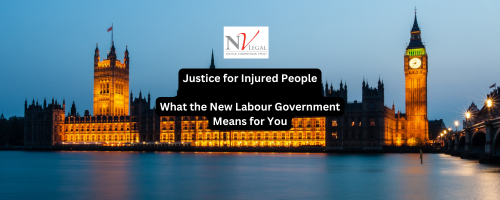Justice for Injured People: What the New Labour Government Means for You
The new Labour government, which came into power in July, has promised changes to justice for injured people. These changes are crucial for ensuring justice and protection for anyone suffering injuries and deserve a fair and supportive legal system.
Plans to strengthen workers’ rights, prioritise road safety, reconsider benefits changes, and address the limitations on child sexual abuse claims form part of the government’s plan to create a fairer and more supportive legal environment.
As personal injury solicitors, we are committed to advocating for these vital reforms and supporting those who have suffered injuries in their pursuit of justice.
Workers’ Rights: Strengthening Protections
The government has announced a comprehensive plan to enhance workers’ rights, addressing long-standing issues in workplace safety and employment status.
Creating a Single Enforcement Body
One key promise is introducing legislation within the first 100 days to create a single enforcement body for workers’ rights. This body will have robust powers to inspect workplaces and act against exploitation. RoSPA pointed out that over the past decade, funding cuts to the Health and Safety Executive (HSE) and local authorities means proactive workplace inspections are only likely to occur once every 250 years on average. This new enforcement body aims to reverse that trend and ensure proactive inspections to protect workers.
Tackling Bogus Self-Employment
Labour intends to simplify the framework for employment status to differentiate clearly between workers and genuinely self-employed individuals. This move is designed to combat the rise of “bogus self-employment,” where employers exploit the current complex system to deny people their legal rights. Strengthening the rights of working people, Labour also aims to empower workers to organise collectively through trade unions. Simplifying the process of union recognition and statutory recognition thresholds will ensure safer workplaces, as research shows that injury rates are 24% lower in unionised workplaces.
Road Safety: Prioritising Lives Over Speed
Road safety is another critical area where the government is expected to make significant strides. More than 50 organisations and individuals from the road safety community have written to the new Secretary of State for Transport, Louise Haigh MP, urging her to prioritise vehicle safety.
Implementing General Safety Regulations
The letter calls for adopting the latest vehicle General Safety Regulation updates to the existing GB Type Approval Scheme. These regulations would make life-saving features such as advanced emergency braking and driver-drowsiness detection mandatory for all new cars sold in the UK. Additionally, these measures would improve crash performance, significantly enhancing protection for women and the elderly in a collision.
Reducing Road Harm
The statistics are stark: more than 30,000 people are killed or seriously injured on UK roads every year, equating to the population of a medium-sized town. The societal and economic cost of road harm is a staggering £43.5 billion annually. Experts predict that adopting the full package of safety measures could prevent over 1,700 deaths and 15,000 serious injuries over the next 16 years, potentially saving up to £7 billion in health costs.
The story of Dev Naran, an eight-year-old killed in a road collision, underscores the urgency of these changes. His mother, Meera Naran, a road safety campaigner, highlights how advanced emergency braking could have saved her son’s life. With 63% of drivers willing to pay more for safety features, there is a strong public mandate for these changes. The new government has the opportunity to make roads safer and prevent families from experiencing such tragic losses.
Ross Moorlock, CEO of Brake, said: “Every single road death or injury is as devastating as the next for the families and communities affected, and we see this first-hand through the work of our National Road Victim Service, which every year supports more than a thousand bereaved or seriously injured families.
“For years, our calls for proven measures to stop road crashes and reduce harm have been ignored. Now, as the new Government is forming, we are hopeful for change.
“We look forward to working with the Secretary of State to support the delivery of safer vehicles that will protect drivers and all road users and, ultimately, improve safety on roads across Britain.”
Benefits Changes: Advocating for Fairness
Disability Rights UK (DRUK) is urging the government to reconsider the Conservatives’ proposed changes to the benefits system.
Scrapping the PIP Consultation
One significant change involves withdrawing the Personal Independence Payment (PIP) reform consultation. The previous government’s proposals included replacing PIP with vouchers or one-off grants and changing eligibility rules. DRUK argues that these changes, driven by a perceived unsustainable rise in PIP claimants, respond to the cost-of-living crisis. Disabled families face higher living costs, and the UK already has one of the least generous welfare systems in Western Europe. Implementing these policies would increase barriers for disabled people, exacerbating their struggles.
Reforming the Work Capability Assessment (WCA)
Another area of concern is the Work Capability Assessment (WCA), which determines the work-related conditions a disabled person must meet to retain their benefits. The planned changes to tighten the WCA criteria from 2025 would deny over 400,000 people with severe mobility or mental health problems additional Universal Credit and protection from sanctions. These changes would push many disabled individuals into poverty without achieving the intended objective of reducing economic inactivity. DRUK and other advocacy organisations call for the government to reconsider these reforms, emphasising the need to involve disabled people in future policy decisions.
DRUK and nine other organisations (including Mind, Sense, and Rethink Mental Illness) have written to the new Secretary of State for Work and Pensions recommending a removal of any WCA changes.
The letter states: “The Office for Budget Responsibility estimates that the planned changes to the Work Capability Assessment from 2025 would mean that by 2028/29, 424,000 people with serious mobility or mental health problems would be denied both extra Universal Credit worth over £400 a month and protection from sanctions. They estimate that just 3% of these people would be expected to move into work in the subsequent four years.
“We do not believe the reforms, therefore, would achieve their stated objective of reducing economic inactivity. Instead, they would condemn seriously ill and Disabled people to a life of poverty and the threat of sanctions.
“The organisations are therefore asking the new government to “think again” before proceeding with these plans, and ensure that disabled people are consulted on any future proposed benefits reforms.
“We ask that Disabled people themselves are put at the heart of future policymaking, that these regulations are dropped, and that longer term plans set out in the Health and Disability White Paper to scrap the Work Capability Assessment, and proposals for the future of PIP, are redesigned with Disabled people at the centre.”
APIL’s Views on Sexual Abuse: Abolishing Time Limits
The Association of Personal Injury Lawyers (APIL) has been vocal about the need for the government to abolish the time limit for child sexual abuse claims. Despite a recommendation from the Independent Inquiry into Child Sexual Abuse (IICSA) nearly two years ago, there has been little progress.
Removing the Three-Year Time Limit
APIL argues that the government should scrap the three-year time limit for abuse survivors to pursue a claim for damages. The current law allows discretion to disapply this limit, but survivors must apply to the court, causing additional distress. Research indicates that it takes survivors an average of 24 to 27 years to come forward due to fear, shame, and guilt. Removing the time limit is a fair and just approach already implemented in Scotland.
Shifting the Burden of Proof
APIL also supports IICSA’s recommendation that defendants should bear the burden of proving if a fair trial is impossible. Currently, survivors must demonstrate that the elapsed time does not hinder a fair trial. This change would make it easier for survivors to seek justice and hold perpetrators accountable.
In other news, the new government has said it will introduce a Victims, Courts, and Public Protection Bill. It will focus on criminal justice issues and deliver a justice system that puts victims’ needs first. As part of its ongoing lobbying, APIL will remind the government and new MPs that people injured by negligence are victims, too. They also need a justice system that puts their needs first. APIL will also call for improved assistance for bereaved families at inquests, which the new government has promised.
NV Legal Ltd
If you want further information on any issues covered, contact us for a FREE, no-obligation consultation. A solicitor with extensive experience in personal injury will help with your query.
Call – 03330 112 732
Email – info@nvlegal.co.uk
Website – nvlegal.co.uk
Find us on social media – Facebook, LinkedIn
Further Reading


